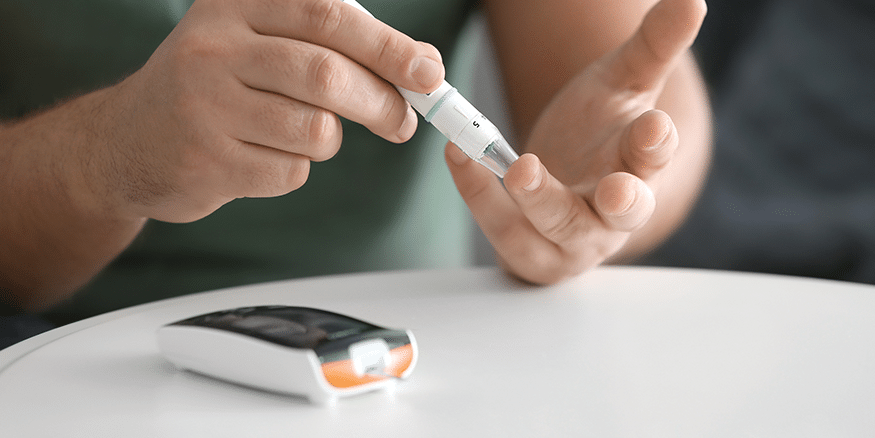Living with diabetes comes with its own set of challenges, and one lesser-known complication is diabetic diarrhea. Diabetic diarrhea refers to persistent, loose, and watery stools that can significantly impact the quality of life of individuals with diabetes. This blog aims to provide a detailed overview of diabetic diarrhea treatment options, focusing on lifestyle changes, medications, and supportive measures.
Contents
- 1 Understanding Diabetic Diarrhea
- 2 Treatment Options for Diabetic Diarrhea
- 2.1 Blood Sugar Management
- 2.2 Dietary Modifications
- 2.3 Hydration
- 2.4 Medications
- 2.5 Probiotics
- 2.6 Medical Consultation
- 2.7 Lifestyle Modifications
- 2.8 Anti-diabetic Medications Adjustment
- 2.9 Bile Acid Sequestrants
- 2.10 Biofeedback and Pelvic Floor Rehabilitation
- 2.11 Pancreatic Enzyme Supplements
- 2.12 Surgical Interventions
- 2.13 Psychological Support
- 3 Which Treatment Method To Choose for Diabetic Diarrhea?
- 4 Conclusion
Understanding Diabetic Diarrhea

Diabetic diarrhea is a gastrointestinal complication that affects some individuals with diabetes. It is characterized by chronic, watery stools and can significantly impact a person’s quality of life. To understand diabetic diarrhea, it’s essential to delve into the underlying causes, symptoms, and contributing factors:
Causes:
- Autonomic Neuropathy: Diabetic diarrhea is often linked to autonomic neuropathy, a type of nerve damage that affects the autonomic nervous system. This system controls involuntary bodily functions, including digestion. Nerve damage can disrupt the normal functioning of the digestive tract, leading to erratic bowel movements and diarrhea.
- Impaired Motility: Diabetes can affect the motility of the gastrointestinal tract, leading to delayed emptying of the stomach and slowed movement of food through the intestines. Sluggish motility can contribute to the accumulation of undigested food, leading to diarrhea when it eventually passes through the system rapidly.
- Bacterial Overgrowth: Changes in the gut environment in diabetes may result in bacterial overgrowth. This overgrowth can interfere with normal digestion and nutrient absorption, contributing to diarrhea.
Symptoms:
- Watery Stools: The hallmark symptom of diabetic diarrhea is the passage of loose, watery stools. The consistency of the stool distinguishes it from normal bowel movements.
- Frequent Bowel Movements: Individuals with diabetic diarrhea may experience an increased frequency of bowel movements, often multiple times a day.
- Urgency and Incontinence: There may be a sense of urgency to have a bowel movement, and in some cases, individuals may experience fecal incontinence.
- Abdominal Discomfort: Abdominal pain or discomfort is not uncommon and may be associated with cramping.
Treatment Options for Diabetic Diarrhea
Diabetic diarrhea can be a challenging complication to manage, but a combination of treatment options can help individuals regain control over their gastrointestinal symptoms. Here are various treatment options for diabetic diarrhea:
Blood Sugar Management
Effective blood sugar management is the cornerstone of diabetic diarrhea treatment. High blood sugar levels can contribute to neuropathy, affecting the nerves that control the digestive system and leading to diarrhea. Monitoring blood glucose levels regularly is crucial for individuals with diabetes. Adjustments to insulin doses or oral medications may be necessary to achieve and maintain optimal blood sugar control.
Maintaining target blood glucose levels is not only essential for managing diabetic diarrhea but also for preventing other diabetes-related complications. Consistent efforts to stabilize blood sugar levels through a combination of medication, lifestyle modifications, and regular monitoring can significantly reduce the severity and frequency of diarrhea episodes.
Dietary Modifications

Diet plays a pivotal role in managing diabetic diarrhea. A well-balanced and fiber-rich diet is recommended to regulate bowel movements. High-fiber foods, including whole grains, fruits, and vegetables, add bulk to the stool, promoting normal bowel function. Fiber also helps stabilize blood sugar levels by slowing down the absorption of glucose.
Dividing meals into smaller, more frequent portions can prevent large spikes in blood sugar levels, reducing the risk of diarrhea. Monitoring carbohydrate intake and choosing complex carbohydrates over simple sugars can contribute to better glycemic control. Consulting with a registered dietitian can provide personalized guidance on creating a diabetes-friendly diet that supports both blood sugar management and gastrointestinal health.
Hydration
Diarrhea can lead to dehydration, a serious concern for individuals with diabetes. Dehydration can affect blood pressure, kidney function, and overall well-being. It is crucial to stay well-hydrated by drinking plenty of water throughout the day. In cases of severe diarrhea, oral rehydration solutions containing electrolytes can help restore the balance of fluids and minerals in the body.
Monitoring urine color, thirst levels, and overall fluid intake is important to ensure adequate hydration. Dehydration can exacerbate diabetic complications, so maintaining proper fluid balance is essential for overall health and well-being.
Medications
Anti-diarrheal medications, such as loperamide, can be used to slow down bowel movements and provide relief from diarrhea symptoms. These medications work by reducing the muscular contractions of the intestines, allowing for increased absorption of water and electrolytes.
In some cases, medications addressing the underlying neuropathy may be considered. For example, medications commonly used for nerve pain, such as gabapentin, might help alleviate symptoms associated with diabetic neuropathy, including diarrhea. It is important to consult with a healthcare professional before starting any new medications to ensure they are appropriate for individual circumstances.
Probiotics
Probiotics are live microorganisms that provide health benefits, especially to the digestive system. In the context of diabetic diarrhea, probiotics can help restore the balance of the intestinal microbiota, supporting improved digestion and overall gastrointestinal function.
These beneficial bacteria can enhance the gut barrier function, modulate the immune system, and contribute to a healthier microbial environment. Probiotics can be consumed through fermented foods like yogurt or supplements. However, it is advisable to consult with a healthcare provider before incorporating probiotics into the treatment plan, as individual responses may vary.
Medical Consultation

Seeking medical guidance is crucial for individuals experiencing diabetic diarrhea. Healthcare providers can assess the severity of symptoms, evaluate the effectiveness of current diabetes management strategies, and make necessary adjustments to medications. They can also rule out other potential causes of gastrointestinal symptoms and provide a holistic approach to treatment.
Regular follow-ups with healthcare professionals allow for ongoing monitoring and adjustments to the treatment plan based on individual responses and changing health conditions. A collaborative approach between the patient and the healthcare team is essential for optimizing the management of diabetic diarrhea.
Lifestyle Modifications
Stress management, regular physical activity, and maintaining a healthy body weight are integral components of managing diabetic diarrhea. Chronic stress can exacerbate gastrointestinal symptoms, so incorporating stress-reducing techniques, such as meditation or yoga, can have a positive impact on overall well-being.
Regular exercise promotes healthy digestion and helps stabilize blood sugar levels. It is important to choose activities that are suitable for individual fitness levels and preferences. Additionally, maintaining a healthy body weight through a balanced diet and regular exercise can contribute to better diabetes management and reduce the risk of complications, including diabetic diarrhea.
Anti-diabetic Medications Adjustment
In addition to general blood sugar management, specific adjustments to anti-diabetic medications may be necessary to control diabetic diarrhea. Some medications, such as metformin, may contribute to gastrointestinal side effects, including diarrhea. Healthcare providers can consider modifying the dosage or switching to alternative medications that are better tolerated by the individual.
It is crucial to communicate openly with the healthcare team about any side effects experienced, as this information guides the optimization of the overall diabetes management plan while minimizing gastrointestinal symptoms.
Bile Acid Sequestrants
Bile acid sequestrants are medications that bind to bile acids in the intestine, reducing their reabsorption. In cases of diabetic diarrhea, these medications may be considered to help regulate bowel movements. By binding to bile acids, these drugs can decrease the secretion of fluids into the intestine and improve stool consistency.
However, the use of bile acid sequestrants should be carefully evaluated by healthcare professionals, as they may have interactions with other medications and could impact the absorption of fat-soluble vitamins.
Biofeedback and Pelvic Floor Rehabilitation
For individuals with diabetes experiencing diarrhea related to dysfunction in the pelvic floor muscles, biofeedback, and pelvic floor rehabilitation may be beneficial. These techniques involve working with a trained therapist to improve muscle coordination and function in the pelvic region, addressing issues such as fecal incontinence and diarrhea.
Biofeedback provides real-time feedback on muscle activity, helping individuals gain better control over bowel movements. This approach can be particularly useful for those with neuropathy affecting the pelvic nerves.
Pancreatic Enzyme Supplements

In some cases, diabetic diarrhea may be associated with pancreatic insufficiency, where the pancreas does not produce enough digestive enzymes. Pancreatic enzyme supplements can aid in the digestion of fats, proteins, and carbohydrates, reducing the malabsorption that can contribute to diarrhea.
These supplements are typically taken with meals and snacks to support the digestive process. However, their use should be guided by healthcare professionals, as inappropriate use or dosage may lead to complications.
Surgical Interventions
In severe cases of diabetic diarrhea that do not respond to conservative treatments, surgical interventions may be considered. Surgical options can include procedures such as colostomy or ileostomy, where a portion of the colon or small intestine is diverted to an external opening, allowing for the removal of stool.
Surgery is generally considered a last resort when other treatment methods have proven ineffective, and its potential benefits must be carefully weighed against the risks and impact on the individual’s quality of life.
Psychological Support
The psychological impact of chronic conditions like diabetic diarrhea should not be underestimated. Individuals may experience anxiety, depression, or stress related to their symptoms, affecting both their mental and physical well-being. Psychological support, such as counseling or support groups, can be valuable in addressing these emotional aspects.
Addressing mental health is integral to holistic diabetes management. Support from mental health professionals can help individuals cope with the challenges of living with a chronic condition, potentially leading to improved adherence to treatment plans and a better overall quality of life.
Which Treatment Method To Choose for Diabetic Diarrhea?
Selecting an appropriate treatment method for diabetic diarrhea involves considering several factors. Here are key determinants that can guide the decision-making process:
1. Severity of Symptoms: Assess the severity of diarrhea symptoms, ranging from mild to severe, to determine the level of intervention required.
2. Underlying Causes: Identify and address the underlying causes contributing to diabetic diarrhea, such as neuropathy, malabsorption, or other gastrointestinal issues.
3. Medication Effects: Consider the potential impact of existing medications on gastrointestinal symptoms, and adjust or switch medications if necessary.
4. Previous Treatment Responses: Assess how the individual has responded to previous treatments or interventions to guide the selection of new strategies.
5. Coexisting Health Conditions: Consider other health conditions the individual may have, as well as any potential interactions between medications for different conditions.
6. Psychosocial Factors: Address the psychological impact of chronic conditions, considering factors such as stress, anxiety, and depression, which can influence overall well-being.
Conclusion
Diabetic diarrhea can be a challenging complication to manage, but with a combination of blood sugar control, dietary modifications, medications, and supportive measures, individuals can find relief and improve their quality of life. Those living with diabetes must work closely with their healthcare team to develop a comprehensive treatment plan tailored to their specific needs. As research continues to advance, new therapeutic options may emerge, providing even more effective solutions for managing diabetic diarrhea.
Do you want to get rid of diabetes? Join our online diabetes treatment program and reverse Diabetes naturally through lifestyle changes such as a Personalized Diet plan, Exercise, Yoga, dieticians, and health coaches.

